Four tenacious women from the Okanagan utilize their skill and ingenuity to build a little truck loaded with community heart and soul.
by Kara Cunningham
On September 30, 2023, a little red fire truck built by an all-female team was sold at auction for a record-breaking $5,400 at the Automotive Retailers Association’s (ARA’s) Members Retreat & Gala Fundraiser. The auction marked a high for the charitable foundation that received the benefit, and it showcased the expertise and resourcefulness of the women who created it.
Background
In 2022, the ARA launched the Pedal Car Challenge as a province-wide initiative designed to introduce students to viable careers in the automotive trades. The Challenge, offered through the ARA’s AutoCareersBC program, provides participating schools with a pedal car to design, modify, and paint, with guidance and mentorship from the ARA’s industry partners (BASF, Color Compass Corporation, Craftsman Collision, and Carstar).
It is no secret that the automotive industry, like most sectors, is struggling to attract and retain talent, and that addressing this labour shortage requires creativity and leadership. Engaging youth is an obvious place to start, as well as tapping into other demographics traditionally underrepresented in automotive trades, especially women, and this is where the annual Women in the Automotive Industry event comes in, along with special projects such as the Pedal Car Challenge.
"It was Stephanie who landed on the idea of creating a firetruck to honour the first responders who fought the fires that ripped through the Central Okanagan in the summer of 2023.”
Last year, along with the ARA’s school-based program, the program’s first all-female team also signed up for the Pedal Car Challenge (Stephanie Appel, Emily Pendlebury, Caitlan Kirkby, and Louise Trenholm). Introduced by Tim Brilz, a technical service representative with BASF, they met at the ARA’s Women in the Automotive Industry event in 2022, and their custom-painted pedal car raised $4,700 for the Automotive Retailers Foundation Inc. (ARFI). ARFI is a registered charitable foundation in Canada with a mission “to conduct charitable activities in Canada for the purpose of advancing education and relieving poverty in Canada, specifically with respect to the automotive trades sector.”
The inaugural Pedal Car Challenge was an unmitigated success.
The Team
This year’s team was once again rounded up by Tim Brilz, a passionate industry advocate and mentor, and its members included Stephanie Appel (Craftsman Collision, Kelowna); Natalie Tremblay (Penticton Craftsman Collision); Jayden Thurlin (Alder Street Auto Body, Summerland); and Chelsea Bay (Parkers Chrysler, Penticton). Three of the four members were new to the challenge, while Stephanie returned to help mentor the team given her experience from the previous year. Stephanie has also recently won gold at the Skills Canada BC provincial competition for car painting, so she brought that expertise to the table as well.
Every member of this year’s team is from the Central Okanagan and have either been trained or are in the process of being trained through Okanagan College in Kelowna. The institution’s Women in Trades Training Program (WITT) seems especially effective at recruiting women, simply through facilitating exposure to the trades and providing financial support, as Stephanie can attest.
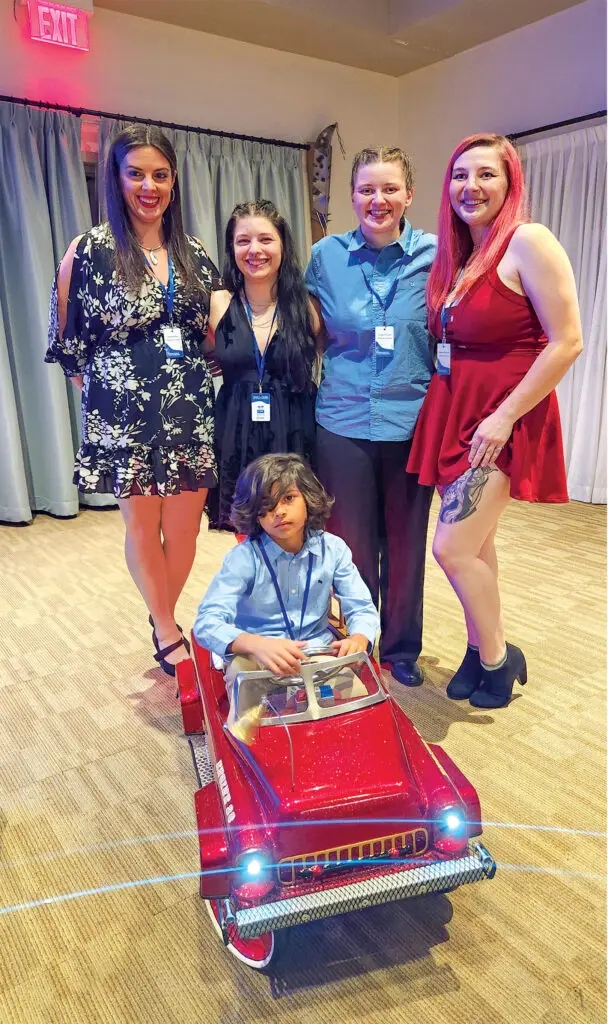
“I did the woman in trades program, which was free for any woman who wanted to get a foot in the door. We went through mechanics, RV, carpentry, plumbing, electrical, and the paint room, but not the body shop, which I was interested in, so out of spite [she laughs], I had them pay for me to take the course! Because I went through WITT, the [college] sponsored me. I figured if I really, really hated it, I could just change courses, but I enjoyed it. So, I did the college’s Automotive Collison and Refinishing foundation program.”
And Stephanie has been a full-time refinisher ever since. So, given her busy schedule, what motivated Stephanie to take on the Pedal Car Challenge not just once but twice?
“At first, it was a chance to try things I haven’t done, like doing a candy coat, pinstripes, sparkles, and all the fancy things that you don’t get to do in day-to-day production,” said Stephanie. “It was a great opportunity, so I said yes. And the networking opportunities are outstanding—it expands your horizons. I also really enjoy meeting other like-minded women in the industry.”
Stephanie’s fellow teammate, Natalie, also began her career through Okanagan College’s Women in Trades Training Program: “Someone I knew had actually taken the program before, and she told me how fun and how good it was, so I decided to give it a shot.”
Natalie said that she especially enjoyed the week that her cohort spent learning about collision repair, so she decided to give it a shot for a career, and she’s now an apprentice.
Natalie’s introduction to The Challenge came via Tim. “Tim showed up at my work one day and asked if I’d like to be part of it,” said Natalie. “I thought—GREAT! It was a chance to get to work with other women that are in the trade, and even though I’m in the trade, I’m the only girl in my shop. So, networking and getting to make some new friends through the project was a neat opportunity.”
"The networking opportunities are outstanding—it expands your horizons. I also really enjoy meeting other like-minded women in the industry.”
Jayden, the third member of the team, had similar motives for joining: “Tim brought it up and mentioned that it was going to be all girls, and I jumped on that immediately because it’s not often you get to meet other women who do what you do. So, I was really excited for the chance to do that.”
And how did Jayden’s automotive career begin? “As a detailer,” she said, “but that only lasted two or three days before I got into prepping, and when I watched the painter walk in and out of the booth, I thought, ‘I want to do that—take something that looks ugly and ragged and the customer is upset, and make it look perfect again.’ That is my favourite part of what I do.”
It was a co-worker of hers, a body man who was already a student in Okanagan College’s Automotive Collision and Refining program, who encouraged Jayden to take the leap.
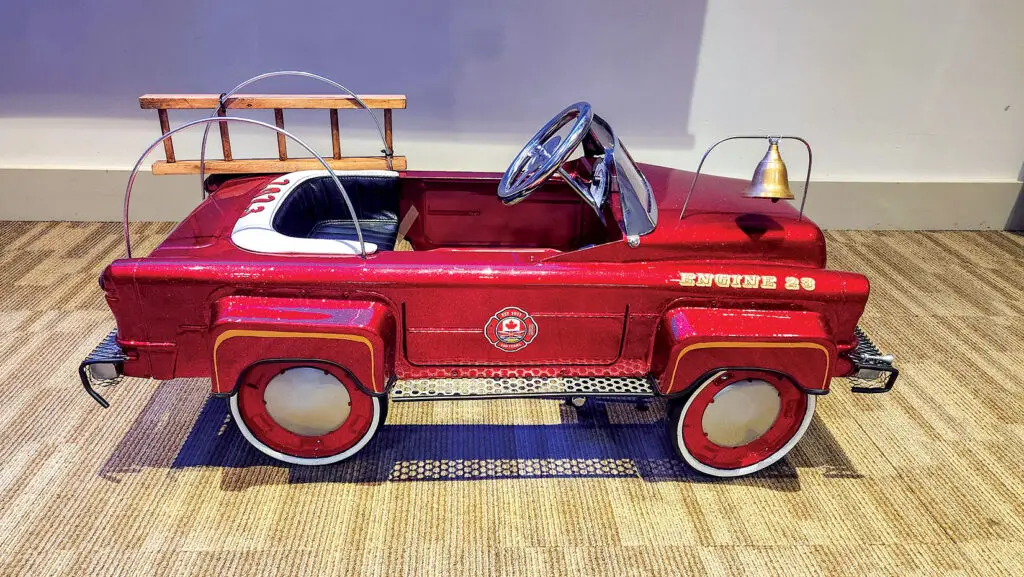
Now, the final pillar of the Pedal Car Challenge women’s team, Chelsea, joined the trade through entirely different circumstances.
“My ex-boyfriend stole my car and put it in a ditch,” said Chelsea. “I got mad because I couldn’t fix it (or pay people to fix it), and I thought I should be able to do it myself. So, I ended up in the automotive program at the OC [Okanagan College] in Kelowna, and I actually brought my car into the course and fixed it.”
Chelsea has now been in the industry for more than 15 years, and she still has that car, a 1987 Trans Am GTA. So, what motivated her to join the Pedal Car Challenge?
“When Tim approached me, I thought it was a fabulous idea,” said Chelsea. “I love doing strange things. ICBC work gets kind of monotonous, so I like to do custom stuff when I can. It keeps your creative juices going.”
The Process
Now with a dedicated team and Tim’s support, the women got to work coming up with a concept for the car, and it was Stephanie who landed on the idea of creating a fire truck to honour the first responders who fought the fires that ripped through the Central Okanagan in the summer of 2023. The fires there destroyed nearly 200 homes, 25,000 square kilometres of trees, bush and grassland, and caused over 720 million in insured damage (the costliest insured event in B.C.’s history).
“When Stephanie brought up the idea to the group, every single person said, ‘That is an amazing idea,’” said Tim. “You’re not just building a car for fun, you’re building something that represents people that helped and volunteered, and even lost their homes. That idea really had some meaning behind it, and the design the team came up with was really impactful.”
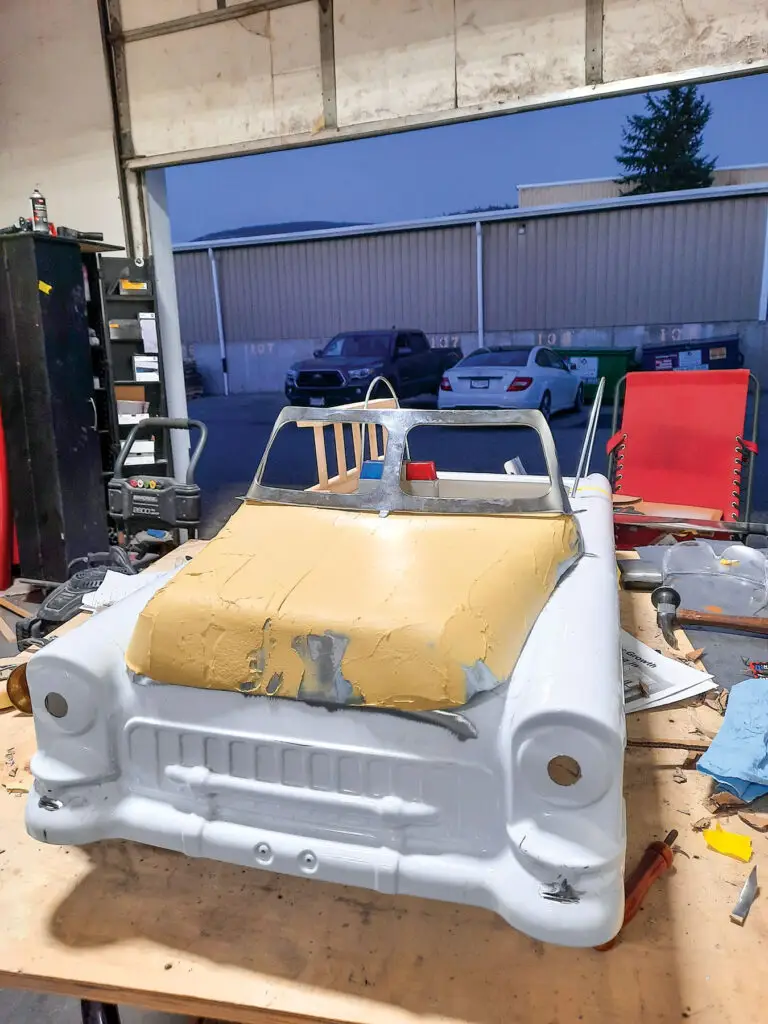
So now the challenge became how do we turn a car into a truck? Everyone had ideas, and the transformation began.
“One of us had a decal maker, so we made a ‘Thank You Frontliners’ decal for the backend of the truck,” said Stephanie. “We did an ‘Engine ‘23’ [representing the year] for the side of the truck, and for the seat, we cut out and embroidered some material, which we had to glue on because it was very last minute. We even put 2023 across the back of the seat. We put some working lights in it. We also found a toy fire truck with some sirens that were battery powered, so we ripped them off the toy and put it in, so it had little working sirens and a little bell.”
And then there was the fabrication. “Definitely the fabrication was a challenge,” said Jayden. “None of us had a background in that, so none of us really had any idea how to build something out of metal. We tried to look for smaller parts that we could use, but we had to make the hood on the pedal car completely from scratch. It was just a flat piece of scrap metal, and we fabricated it from all these little pieces. Chelsea was the mastermind behind that, actually.”
And this is where Tim came in handy yet again.
“Tim introduced us to Dan Runge from the Alley Shoppe (located in Kelowna). Dan is a fabricator, and he gave us some materials and some ideas,” said Stephanie. “Some of the girls built and shaped the hood, and they welded it on. But then we really got stuck about what we wanted to do for the fenders. We got so stuck that we were trying to find old bike fenders and even went to junk yards. And then Chelsea went to the Dollar Store and saw some Betty Crocker baking pans, and she was like, ‘Yeah! That’s it!’”
“We had to fabricate quite a bit of it,” said Chelsea. “We put a taller hood on it to make it look more like a truck. We put flares on it because trucks have flares, and we added running boards and bigger bumpers to make it look more industrial, like a fire truck.”
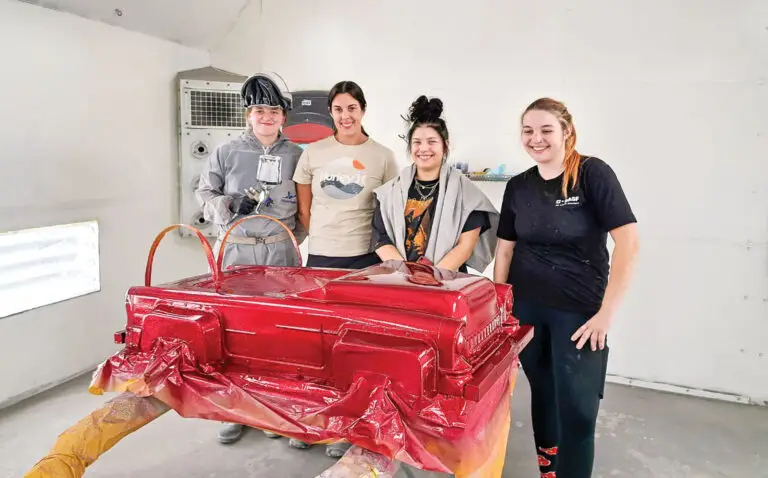
The team estimates that about 80 hours of work went into the truck, which brings us to the other major challenge they faced—time constraints. “It was a lot of late nights,” said Natalie. “We were meeting every night after work to try and get stuff done. We didn’t have a lot of time to do what we wanted to do. But logistically, it got a little hard because Stephanie and Tim were in Kelowna, and the rockslide happened in August between Penticton and Kelowna on Highway 97, closing the road for nearly a month, so it was hard for everyone to meet.”
Final Words
And that’s the story of how the pedal car that received the highest bid to date at the ARA’s charitable auction was built. But for the team that built it, the memories, camaraderie, and mutual support will carry on.
“It was an amazing experience,” said Jayden. “We worked so well together as a team, and we all got along so well. We created friendships through the whole thing. And what’s even more awesome is now, if I have any problems at work, I can bounce ideas off these women, and they’ll support me.”
Natalie concurred: “It was a very good crew. They were super cool to connect with. We were focused, but we definitely got close working together on the project. And now, the best part, wherever we go, we have this team we can call on for support. That’s fantastic!”
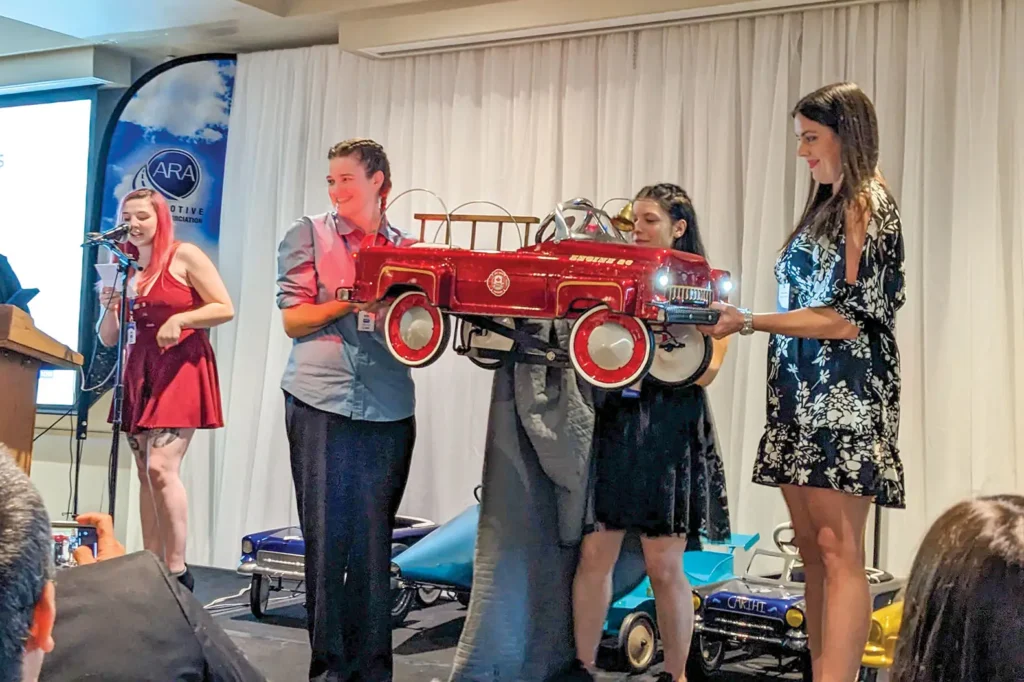
Photo: Automotive Retailers Association
And from Chelsea’s point of view: “There was no ego. There was no drama. There was not any of that. It was just fun hanging out at the shop, working on the car, getting all these neat things done, and everybody contributed. There was no one main person or anything. It was just great.”
Stephanie echoed similar sentiments but also wanted to acknowledge Tim and his assistance on behalf of the team.
“He was Shop Dad! And I think the other would all agree,” said Stephanie. “Tim got us materials, and he introduced us to the people that we needed to talk to. He was our cheerleader and our biggest supporter. He helped us prep it [the pedal car]. He brought materials for painting. He supervised, and he basically came in and just made sure we were okay.”
Mission accomplished, ladies. Your employers are lucky to have you, and we cannot wait to see how your careers unfold in the future.
